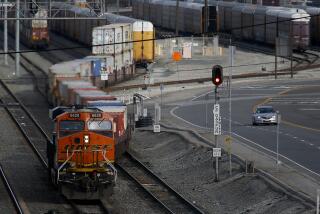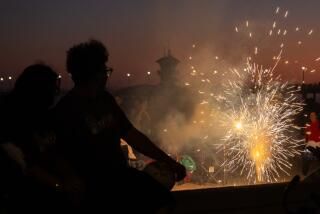As Olympics near, Beijing still can’t beat pollution
- Share via
BEIJING — Despite China’s removing 1.5 million cars from the roads, shutting down hundreds of factories and construction sites and bringing much of the city’s economic life to a standstill, Beijing’s air pollution remains at stubbornly high levels.
Just 11 days before the opening of the Summer Olympics, the city’s skyline was shrouded in haze Monday, leaving government officials scrambling for explanations that ranged from statistical anomalies to the 90-degree-plus heat.
“Beijing’s air quality is not up to what the world is expecting from an Olympic host city; the sports teams have reason to be concerned,” said Lo Sze Ping, Greenpeace’s campaign director in Beijing, during a press conference Monday. He blamed the dirty air on what he characterized as a “develop first, clean up later” approach by the Chinese government.
“It is not good enough,” Lo said.
The state-run China Daily reported Monday that the Chinese government may be forced to implement an “emergency plan” if the air quality hasn’t improved 48 hours before the Games’ Aug. 8 opening ceremony. One possible measure would expand the system that allows cars on the road only on odd or even days, depending on license plate numbers, to ban up to 90% of private traffic on a given day.
Beijing’s pre-Olympic clampdown on pollution has already snuffed out much of the economic life of the region. Along with the license-plate-based restrictions that took effect July 20, the city has banned many out-of-town cars and trucks from its streets and suspended all construction work. Factories up to hundreds of miles away have been closed.
But the air quality levels haven’t improved at all and for the past few days have been actually worse.
Even over the weekend when traffic was at a minimum, the air pollution level around the Olympic stadium was more than twice the standard set by the World Health Organization, stuck in the category that the Chinese government terms “unhealthy for sensitive groups.” On Monday, air pollution was barely within the “acceptable” level.
Beijing calculates a daily air pollution index from 1 to 500 based on measures of four pollutants. Days on which the index is under 100 are said to be acceptable. The Chinese government claims that air quality has greatly improved since 2001 when Beijing won its bid to host the Games with promises to clean up the local atmosphere. In that period, Beijing has tightened emission standards and built four new subway lines.
“Indeed we have reached our commitment to make sure air quality is satisfactory for the Games,” Beijing environmental protection official Du Shaozhong told reporters on Saturday. So far this year, he said, 70% of days had acceptable levels of pollution, an increase of 20% over last year.
But Steven Q. Andrews, a U.S. environmental consultant who analyzed Beijing’s figures, says the Chinese have tweaked the data. For example, two air monitoring stations in congested parts of downtown have been dropped from the government’s calculations for the air pollution index, while monitors in the outskirts have been added.
The Chinese government also fails to measure ground-level ozone, a major pollutant in smog. And it calculates inhalable particulate matter using a now largely discredited measurement that looks primarily at larger particles, rather than the tiny particles that are more damaging to lungs.
“They are manipulating the way they measure and what they measure so much that you cannot say the air quality is improving,” said Andrews. “But their insistence that air quality has improved takes the pressure off of local officials and factory owners to run emissions control technology and do what they really need to do.”
The problem for Beijing is an unfortunate location in a basin surrounded by three mountains that trap pollutants. It must also cope with the fact that since 2001, the number of automobiles in the city has roughly doubled.
Some Olympic teams have chosen to conduct pre-Olympic training in Japan and South Korea to minimize exposure to Beijing’s polluted air. Athletes have also been given permission to wear face masks to protect their lungs.
Environmentalists in China, however, worry less about the Aug. 8-24 Olympic period than the aftermath. They fear that, once the Olympic moment passes, Chinese authorities will lose the political will to take tougher environmental measures.
“Beijing has missed a golden opportunity to use the Olympics as a platform for more ambitious programs to clean up the air,” said Lo of Greenpeace.
More to Read
Sign up for The Wild
We’ll help you find the best places to hike, bike and run, as well as the perfect silent spots for meditation and yoga.
You may occasionally receive promotional content from the Los Angeles Times.






